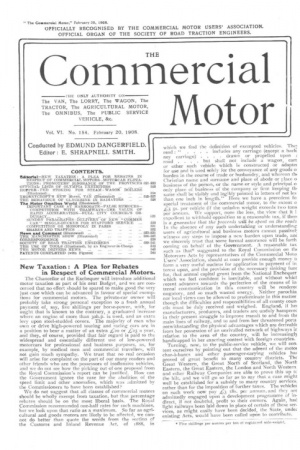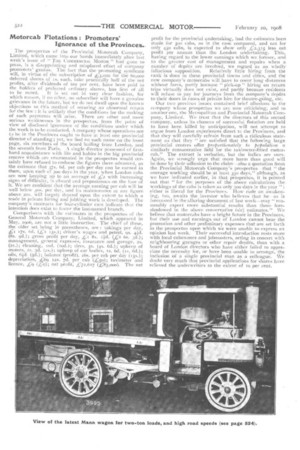New Taxation : A Plea for Rebates in Respect of Commercial Motors.
Page 1

Page 2

If you've noticed an error in this article please click here to report it so we can fix it.
The Chancellor of the Exchequer will introduce addition-al motor taxation as part of his next Budget, and we are con cerned that no effort should be spared to make good the very just case which can be advanced in favour of special exemptions for commercial motors. The private-car owner will probably take strong personal exception to a fresh annual payment of, say, five shillings per horse-power, with, for aught that is known to the contrary, a graduated increase where an engine of more than 3oh.p. is used, and an extra levy upon steel-studded covers. The majority of men who own or drive high-powered touring and racing cars are in
a position to bear a matter of an extra or £25 a year, and they, of course, provided that fair regard is paid to the widespread and essentially different use of low-powered motorcars for professional and business purposes, as, for example, by medical men and commercial travellers, will not gain much sympathy. We trust that no real occasion will arise for complaint on the part of our many readers and other friends who are the possessors of inoffensive vehicles, and we do not see how the picking out of one proposal from the Royal Commission's report can be justified. How can the Government ignore the case for the abolition of the speed limit and other anomalies, which was admitted by the Commissioners to have been established?
We do not suggest that all classes of commercial motors should be wholly exempt from taxation, but that percentage rebates should be on the most liberal basis. The Royal Commission recommended one-half rates for such machines, but we look upon that ratio as a maximum. So far as agricultural and goods motors are likely to be affected, we cannot do better than quote the words from the section of the Customs and Inland Revenue Act, of 1888, in which we find the definition of exempted vehicles. The
read " . . . ineludes any carriage (except a hack
ney carriage) . . . drawn or propelled upon road . . . but shall not include a wagon, cart or other such vehicle which is constructed or adaptet for use and is used solely for the conveyance of any goods a burden in the course of trade or husbandry, and whereon thi Christian name and surname and place of abode or Flace o business of the person, or the name or style and principal o only place of business of the company or firm keeping thi same shall be visibly and legibly painted in letters of not lcs than one inch in length." Here we have a precedent fo special treatment of the commercial motor, to the extent o Ls 5s. per vehicle (if the unladen weight exceeds two tons per annum. We support, none the less, the .view that it i expedient to withhold opposition to a reasonable tax, if then is a guarantee that the proceeds will be spent on the roads In the absence of any such undertaking or understanding users of agricultural and business motors cannot passive!! witness any steps to impose a new burden upon trade, an< we sincerely trust that some formal assurance will be forth corning on behalf of the Government. A reasonable tax such as that* suggested to the Royal Commission on tin Motorcars Acts by representatives of the Commercial Moto: Users' Association, should at once provide enough money n form a very useful nucleus for application in payment of in terest upon, and the provision of the necessary sinking fund for, that annual capital grant from the National Exchequer which we feel confident is inevitable, and without whict recent advances towards the perfection of the means of internal communication in this country will be renderer nugatory, and so much wasted energy. Neither parochia nor local views can be allowed to predominate in this matter though the difficulties and responsibilities of all county councils must be duly received and weighed. England, if het manufacturers, producers, and traders are unduly hamperec in their present struggle to improve transit to and from thE main lines of railway, and to and from her threatened ports notwithstanding the physical advantages which are dertvabl( from her possession of an unrivalled network of highways ir relation to the area of the country, will be increasing!) handicapped in her exacting contest with foreign countries. Turning, now, to the public-service vehicle, we will con tent ourselves by pointing out that the advent of the motot char-6.-bancs and other passenger-carying vehicles has proved of great benefit to many country districts. Th.( Great Western, the Great North of Scotland, the North Eastern, the Great Eastern, the London and North Western, and other Railway Companies are able to prove this up lc the hilt, and we will go so far as to say that a case might well be established for a subsidy to many country services, rather than for the imposition of further taxes. The vehicles on such work now pay -473 x8s. per annum, and they are admittedly engaged upon a development programme of in direct, if not doubtful, profit to their owners. Again, had light railways been laid down in place of certain of these ser. vices, as might easily have been decided, the State, undei existing Acts, would have been called upon to contribute.
Motorcab Flotations : Promoters' Ignorance of the Provinces...
The prospectus of the Provincial Motorcab Company, Limited, which came into our hands immediately after last week's issue of " ThE COMMERCIAL MOTOR " had gone to press, is a disappointing and misplaced effort of company promoters' genius. The fact that the promoting syndicate will, in virtue of the subscription of -,/,;3,000 for the 6o,000 deferred shares of is. each, take practically half of the net profits, after dividends of ten per cent, have been paid to the holders of preferred ordinary shares, has first of all to he noted. It is set out in very clear fashion, for which reason, if no other, no subscriber will have a genuine grievance in the future, but we do not dwell upon the known objections to this method of securing an abnormal return for the few it is unlikely that the conditions for the making of such payments will arise. There are other and more serious weaknesses in the prospectus, from the point of view of disclosed ignorance of the conditions under which the work is to be conducted. .1 company whose operations are to be in the Provinces ought to have at least one provincial director of standing; yet, we find no such name on the front page, six members of the board hailing from London, and the seventh from Paris. A. single director possessed of firsthand acquaintance with life and habits in the big provincial centres which are enumerated in the prospectus would certainly have refused to endorse the figures there advanced, as the estimate that 37s. titl. per cab per day can be earned in them, upon each of 300 days in the year, when London cabs are now keeping up to an average of -/;2 with increasing signs of difficulty, is absurd and preposterous on the face of it. We are confident that the average earning per cab will be well below 3os. per day, and its maintenance at any figure above 205. will largely depend upon the extent to which a trade in private hiring and jobbing work is developed. The company's contracts for four-cylinder cars indicate that the intention does exist to foster the last-named branch.
Comparisons with the estimates in the prospectus of the General Motorcab Company, Limited, which appeared in May, toot), are not a little instructive, The chief of these, the older set being in parentheses, are : takings per day,
us. 6d. (L:t iss.); driver's wages and petrol, gs_ 40. (8s. 9d.); gross profit per day, ,,..(jt 8s. 1;d. (Cr 6s. 3d.); management, general expenses, insurance and garage, 25. (25.); cleaning, rod. (Tod.); tires, 55. (4s. 6d.); upkeep of motors, 2S. 3d. (2S.) ; upkeep of car bodies, Is. 6d. (is. 6d.); oils, 60. (sd.); balance (profit), 16s. per cab per day (15s.); depreciation, ..;69 I2S. 7d. per cab (45o); taximeter and licence, .4;9 (Lro); net profit, 1772,617 1L;83,000l. The net profit for the provincial undertaking, had the estimates been made for 500 cabs, as in the case compared, and not for only 450 cabs, is expected to show only Z2,315 less net profit per annum than the London undertaking. This, having regard to the lower earnings which we foresee, and to the greater cost of management and repairs when a number of depots are involved, we regard as an wholly fallacious supposition. Relatively little hiring from the rank is done in these provincial towns and cities, and the new company's motorcabs will have to cover long distances without fares, partly because " pick-up " hiring on return trips virtually does not exist, and partly because residents will refuse to pay for journeys from the company's depots to their doors in cases of private hire for theatre-going, etc.
Our two previous issues contained brief allusions to the company whose prospectus we are now criticising, and to another one, the Metropolitan and Provincial Motorcab Company, Limited. We trust that the directors of this second company, unless its chances of successful flotation are held to have been killed by anticipation, will not attempt to argue from London experiences direct to the Provinces, and that they will carefully refrain from such a ridiculous statement as that they " are satisfied that the following large provincial centres offer proportionatay to population a similarly remunerative field for the taximeter-fitted motorcab." The extract is verbatim, but the italics are ours. Again, we strongly urge that more harm than good will be done by their adhesion to the clairn—also a quotation from the Provincial Motorcab Company's prospectusthat " the average working should be at least 330 days," although, as we have indicated earlier, in that prospectus, it is pointed out that " for the purposes of the above calculations the workings of the cabs is taken as only 300 days in the year either is liberal for the Provinces. How rude an awakening, too, awaits the investor who believes that he—as is forecasted in the alluring document of last week—may " reasonably expect more substantial results than those foreshadowed in the above conservative (sic) estimates." We believe that motorcabs have a bright future in the Provinces, but their use and earnings out of London cannot bear the promotion and other preliminary expenses that are set forth in the prospectus upon which we were unable to express an Opinion last week. Their successful introduction rests more with local .cabowners and jobmasters, acting in concert with neighbouring garages or other repair depots, than with a board of London directors who have either failed to appreciate the necessity for, or have been unable to arrange, the inclusion of a single provincial man as a colleague. We doubt very much that provincial applications for shares have relieved the underwriters to the extent of to per cent.




























